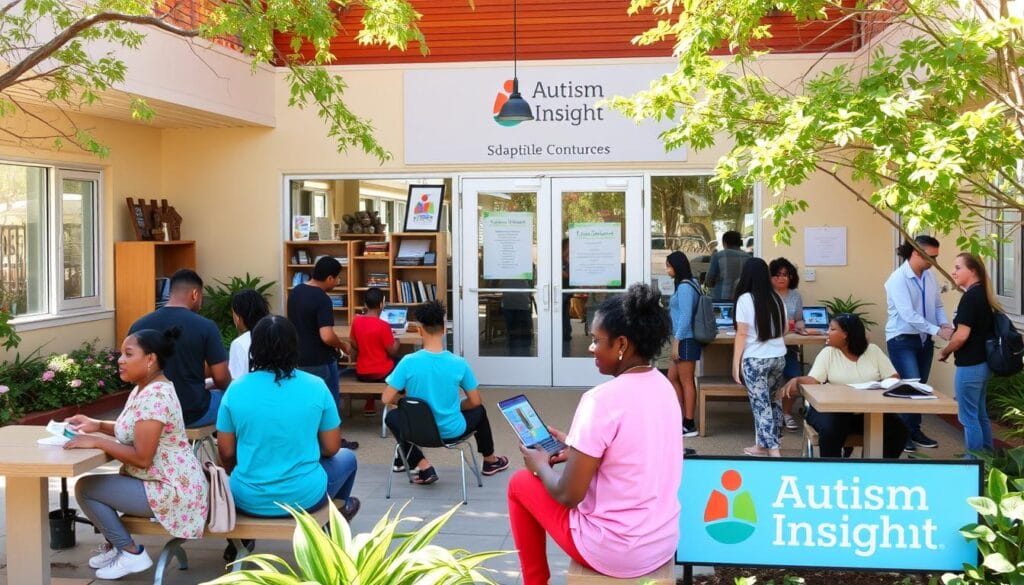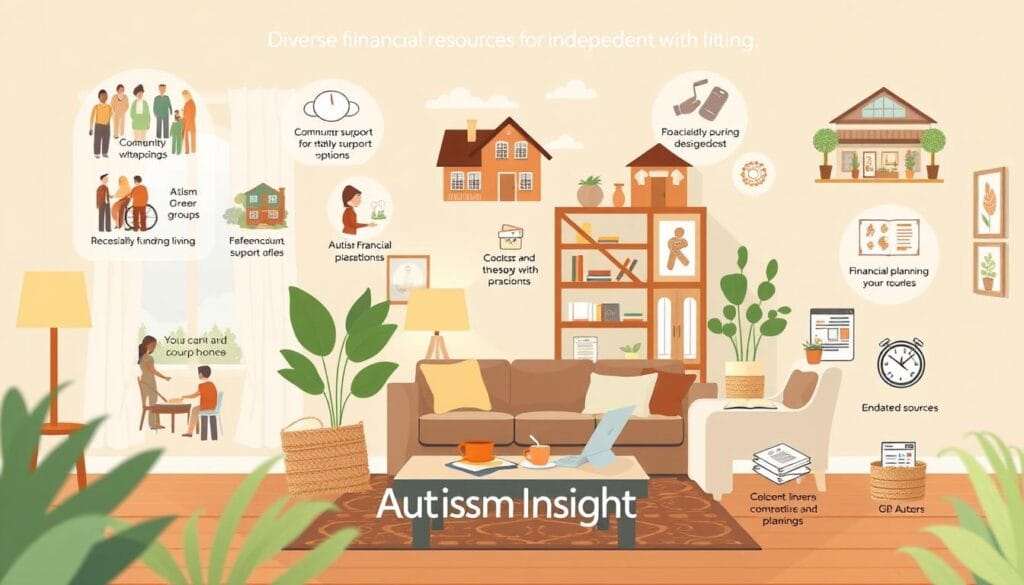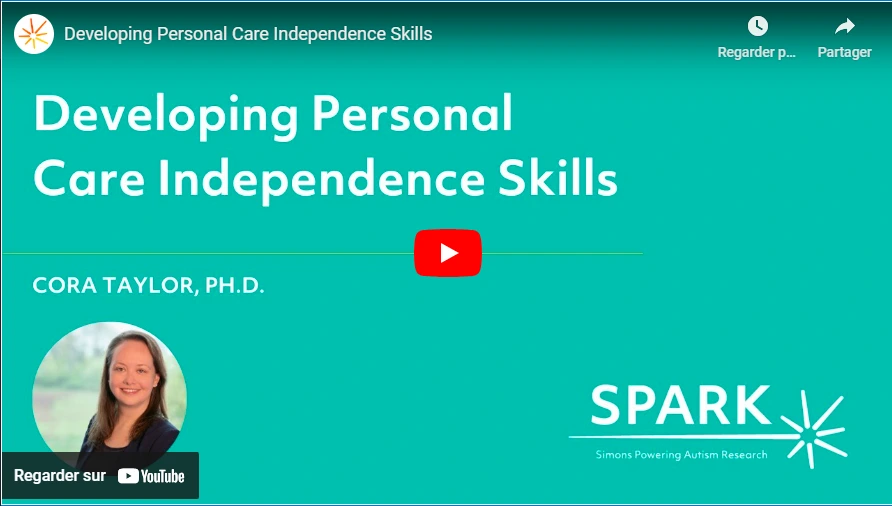Imagine stepping outside and feeling the thrill of freedom. For many, this is a daily routine. But for those on the autism spectrum, the journey to independence is unique.
Can autistic people live alone? The conversation around this is changing. It’s breaking old molds and showing a brighter future full of possibilities for autistic adults.
More autistic adults are living independently now, thanks to supportive programs. For example, The Gersh Experience helps high school graduates with Asperger’s Syndrome become self-sufficient.
This progress not only improves their lives but also challenges old beliefs. It demonstrates what autistic individuals can achieve.
In this guide for autistic adults, we’ll explore what it truly means to live independently with autism. We’ll take a closer look at essential life skills, resources, and options available for independence. You’ll discover the wide range of opportunities that make it possible for those with autism to live on their own.
Table of Contents
Key Takeaways
- The number of autistic adults living independently is increasing due to more available supportive services.
- Programs like The Gersh Experience help autistic individuals transition to independence.
- Group homes offer semi-independent living with support, promoting self-care skills.
- Employment opportunities are crucial for fostering independence in autism.
- Many autistic individuals choose living arrangements based on their personal needs and support systems.
Understanding Independence for Autistic Individuals
Independence for autistic individuals is more than just living alone. It depends on age, gender, and skill levels. Only 5% of autistic adults live on their own, while 37% need overnight care.
This shows the big differences in what people need and can do. It’s important to understand these differences.
Autonomy can mean different things to different people. Some like living with support, while others prefer to be alone. Almost 79% of adults with autism live on their own, but many still need family or housing help.
Learning skills like self-care and talking is key to being independent. This helps them take care of themselves and live on their own.
Having access to community programs and services is very important. Places like Easterseals help with jobs and joining the community. Special programs and tools, like visual checklists, help with daily tasks.
Learning basic life skills in school is crucial for independence. Doing chores at home helps with responsibility and skills. Focusing on what each person is good at makes them want to learn more.
Understanding the challenges autistic individuals face is the first step to better support. Helping them join community activities boosts their independence and sense of belonging.
What It Means to Live Independently with Autism
Living independently with autism means more than just having a place to live. It’s about being self-reliant and handling daily tasks on your own. This includes managing money, following routines, and being part of your community.
About 79% of autistic adults live on their own, but everyone’s experience is different. Being able to handle daily tasks is crucial. Challenges like sensory issues, planning, and controlling emotions can make things harder.
Managing money is key to being independent. Learning to budget and understand personal finance is essential. Programs like the Independence Program by Therapeutic Pathways help with these skills, making it easier to handle expenses.
Being part of your community is also vital. Access to education and social activities helps you feel connected. Being able to connect with your neighbors not only builds friendships but also helps you become more self-sufficient.
- Supported living arrangements provide tailored assistance for young adults
- Supervised group living caters to those requiring greater support
- Vocational training enhances communication and job-specific skills
A study found that stability, financial skills, and community involvement are key to living independently. Having a supportive environment with the right resources makes a big difference. Working towards a fulfilling life means overcoming challenges and building the skills needed for independence.
Can Autistic People Live Alone?
Understanding how autistic individuals develop autonomy is key. It shows that independence in autism is not just about doing daily tasks. It also involves mental strength and confidence to face the world. This part explores what autonomy means for autistic people, highlighting how independence can differ for each one.
Defining Autonomy in Autism
Autonomy in autistic individuals can vary a lot. Some may be fully independent, while others need more support. Factors like age, skill learning, and resources play a big role in developing autonomy. Early help is crucial to build skills before the teenage years.
Questions about safety and emergency responses can help gauge readiness for independence. Professionals, like occupational therapists, are key in preparing autistic teens for self-reliance.
Different Levels of Independence
Independence in autism can vary a lot. Knowing that autism spectrum disorder (ASD) has different support levels helps understand these differences. Here’s a quick look:
| Support Level | Description | Independence Potential |
|---|---|---|
| Level 1 | Requires some support | Can live independently with minimal assistance |
| Level 2 | Requires substantial support | May need help with daily living tasks |
| Level 3 | Requires very substantial support | Likely needs ongoing help for most tasks |
These levels show that not all autistic individuals will reach the same level of independence. The path to independence can be tailored to each person. It allows them to build essential skills at their own pace. Also, practicing skills in less overwhelming places can help avoid sensory overload and make learning more comfortable.
Key Skills for Independence in Autism
Independence for autistic individuals depends on several key skills. These include daily living skills, financial management, and social skills. Each skill area is crucial for self-sufficiency, well-being, and better relationships.
Daily Living Skills
Daily living skills for autistic individuals cover important tasks like personal hygiene and meal prep. About 50% of autistic teens lack these skills compared to their peers. Structured routines can improve their ability to do daily tasks by 60%.
Programs like “Surviving and Thriving in the Real World (STRW)” teach these skills. They use techniques like task breakdown and time management.
Financial Management Strategies
Financial management is key for independence. Teaching money skills before 16 can increase the chance of independent living by 75%. Autistic individuals learn to budget, save, and make smart financial choices.
These skills help them manage their finances without relying on others. It empowers them to handle their money confidently.
Social Skills Development
Social skills are vital for independence. They help autistic individuals engage with the community and support their emotional health. About 80% of autistic teens face challenges in daily living skills that impact social interactions.
Parents who involve their children in household chores see a big boost in confidence. This shows the importance of social environments. Strategies that encourage practice and preparedness help reduce anxiety, leading to better emergency and social interaction readiness.
Living Options for Autistic People
Autistic individuals have many housing choices. These options range from lots of support to more independence. Each choice has its own benefits and challenges, affecting how well someone lives.
Living with Family
Many autistic adults still live with their families. This setup is comforting and provides emotional support. About half of autistic adults live this way, helping them learn important skills.
But, there are downsides. Living with family can limit independence. It can also be stressful for family members.
Group Homes
Group homes are another option. They house 2 to 10 people and offer support around the clock. About 15% of autistic adults live in group homes.
These homes help people socialize and learn to live more independently. They provide a place for those needing a lot of help.
Supported Shared Living Arrangements
Supported shared living combines independence with community support. Residents have their own rooms but share common spaces. This setup helps people live independently while getting the support they need.
About 25% of autistic adults live in these arrangements. They help people achieve their goals in a supportive environment.
Programs and Services Supporting Independence
In the United States, many programs help neurodiverse individuals, like those with autism, live independently. These efforts improve daily skills, encourage self-advocacy, and help with social interactions.
In Whippany and Livingston, NJ, special day programs are available for adults with autism. They run from 9 am to 3 pm, Monday to Friday. The programs offer group lessons in 30 to 60 minutes, teaching various skills.
Programs for autistic individuals include:
- Prevocational and Supported Employment Services: These services help find jobs and offer support from certified job coaches.
- Community Involvement: Participants go on community trips or learn in real-world settings four to five times a week.
- Life Skills Development: Training covers personal growth, technology, healthcare, safety, financial literacy, and self-direction.
People living in independent settings have personalized schedules. They enjoy high-quality apartments and social activities three to four times a week.
Key parts of these programs are:
| Feature | Description |
|---|---|
| Cooking Instruction | Residents learn cooking skills to become more self-sufficient. |
| Financial Management | Budgeting skills are taught to help with independence. |
| Travel Training | This skill helps with using public transport for more independence. |
| Social Activities | Weekly potluck gatherings promote communal cooking and socializing. |
| Staff Support | 24/7 on-call staff provide ongoing help for residents. |
These programs greatly help autistic individuals live on their own. Testimonials show improvements in self-management, social skills, and financial awareness. It’s crucial to keep improving these programs to support neurodiverse individuals better.

Challenges Faced by Autistic Individuals Seeking Independence
Starting the journey to live independently is tough for autistic people. It’s hard because of emotional control and social connections. Having a strong support system helps a lot.
Emotional Regulation and Coping Strategies
Managing emotions is a big challenge for many autistic individuals. It can make everyday tasks and social interactions hard. About 45% also deal with anxiety, making things even tougher. To help, there are a few strategies:
- Structured routines that provide predictability.
- Mindfulness and relaxation techniques to reduce anxiety.
- Social skills training to enhance understanding of social cues.
- Access to community resources for emotional support and guidance.
Community Engagement and Social Interaction
Getting involved in the community is key for independence. But, many autistic people face big hurdles. Around 60% struggle with social communication, and 50% find daily tasks hard. To help, consider these steps:
- Tailored vocational training to improve job prospects.
- Inclusive community programs that promote social interaction.
- Peer mentorship opportunities to build social networks.
| Challenge | Impact | Proposed Solution |
|---|---|---|
| Emotional Regulation | Hinders daily task management | Structured routines, mindfulness techniques |
| Social Communication | Complicates social interactions | Social skills training, community engagement programs |
| Daily Living Skills | Challenges in achieving independence | Life skills development, vocational training |
It’s crucial to tackle these challenges for autistic individuals to live independently. Improving emotional control and community involvement can greatly help them on their path to freedom.
Funding and Resources for Independent Living
Getting financial help for living on your own is key for many with autism. There are many ways to get funding to help with the costs of living alone. Knowing about government help and special programs can guide you towards being more independent.
National Disability Insurance Scheme (NDIS)
The National Disability Insurance Scheme (NDIS) helps people with disabilities, like autism, live more independently. It pays for things like therapy, help with daily tasks, and getting around. This program helps people reach their goals and join in community activities.
Many with autism find NDIS very helpful. It lets them live more freely and happily.
Social Security and Other Financial Supports
Social Security is a big help for those wanting to live on their own. You might get Supplemental Security Income (SSI) if you don’t make too much money. Families with a disabled child can also get SSI if they make less than $4,695 a month together.
Single parents with a disabled child can get help too. They can make up to $3,781 a month and still qualify.
Programs like Temporary Assistance for Needy Families (TANF) give cash help for up to five years. Safety Net Assistance also helps those who don’t qualify for Family Assistance for up to two years. These programs are key in helping families and individuals start their journey to independent living without financial worries.
| Support Type | Eligibility/Requirements | Duration |
|---|---|---|
| Supplemental Security Income (SSI) | Monthly earnings | Ongoing |
| TANF | Eligibility varies based on family circumstances | Up to 5 years |
| Safety Net Assistance | Not qualifying under Family Assistance | Up to 2 years |

Empowering Autistic Individuals for Self-Reliance
Helping autistic individuals become independent means giving them the skills they need. These skills help them feel confident and ready for adulthood. It’s all about building life skills and boosting their self-confidence.
Encouraging Life Skills and Confidence Building
Teaching life skills is key for autistic individuals to live on their own. By focusing on real-life situations, you can help them grow. Here are some ways to support their development:
- Goal Setting: Help them set goals that are reachable. This gives them direction and keeps them motivated.
- Celebration of Achievements: Celebrate their small wins. This boosts their confidence and sense of accomplishment.
- Supportive Environment: Surround them with people who support them. This builds their self-esteem and helps them become more independent.
- Skills Training Programs: Joining structured programs can greatly improve their skills. Studies show it can increase their independence by up to 40%.
- Assistive Technology: Using technology to help with daily tasks can improve their skills by up to 50%. It gives them the tools they need to manage their lives.
It’s important to understand what autistic individuals need and tailor strategies to their strengths. A proactive approach involving families and communities creates a strong support system. This helps them on their journey to self-reliance.
Discover also our post: All Autistic People Are Introverted” : Myth or Truth?
Conclusion
Autonomy in autism is a journey that changes a lot for each person. Only a small number of autistic adults live on their own now. But, we’re getting better at knowing what skills and support they need to be independent.
It’s important to remember that being independent means different things to different people. It’s about having the skills and choices you want in life. Everyone has their own path to independence.
Getting better at everyday tasks, managing money, and making friends are key. These skills help people with autism live their lives better. It’s also important to have support that fits each person’s needs.
Supportive programs can help you live a full and independent life. They make the journey easier and more rewarding.
Many autistic people live happy, meaningful lives. Age, gender, and how smart someone is can affect their ability to live alone. But, with the right help, anyone can achieve independence.
By learning about and using the resources available, you can improve your life. You can take steps towards a more independent future.

